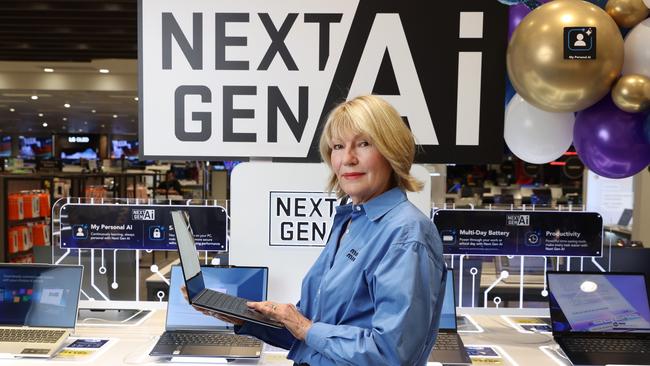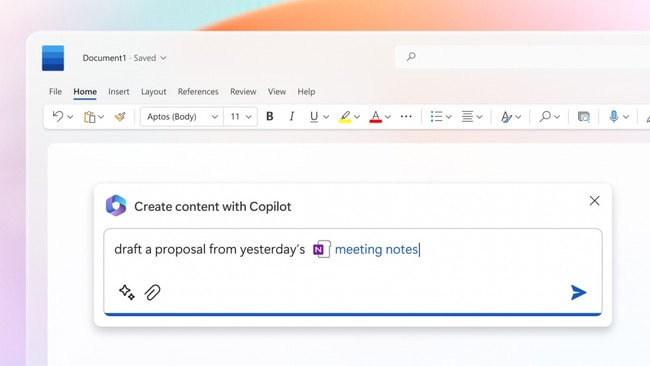A ‘tug of war’ has developed between staff and management over Copilot’s time savings
Microsoft’s AI assistant saves workers an average of about 20 hours a month allowing them to concentrate on important work. But a debate has emerged about how to share those time savings.

Employers are facing a “tug of war” with staff about how to best share the hours of time saved each week thanks to artificial intelligence as more companies use platforms like Microsoft’s Copilot to remove “drudgery”.
And Australia’s biggest telco, Telstra, is attempting to convince some employees – particularly software engineers – that they are not “cheating” using Copilot, which Microsoft launched a year ago.
More than 1100 Australian companies are using the AI assistant – and the number is almost doubling quarter on quarter transforming white collar jobs, Microsoft says.
Telstra has bought about 21,000 licences for staff. Chief executive Vicki Brady has declared “what we do and deliver has to transform”.
The telco has already saved up to $15m by incorporating AI into its smart modems, allowing faults to be fixed “behind the scenes” and resulting in fewer calls to its customer contact centre.
Life insurer TAL and Colonial First State allow 75 per cent of their staff to access Copilot, as chief executives say AI is one of only the few levers they can pull to lift flatlining productivity, according to The Australian’s 2024 CEO survey.

Microsoft corporate vice president for AI at work Jared Spataro said Copilot was saving a staff member about 20 hours a month on average. But there was a debate across businesses about how to best use that extra time.
“What has been interesting is when you save an individual employee time, they pocket some of it and they rightly should. I think almost every employee in every industry and every company across the world feels like ‘man, I have a hard job’,” Mr Spataro said.
“So what we see happening is, if you save somebody 20 hours a month, great, like ‘I could use some of that time back, not necessarily to give back to the company, but to give back for better work/life balance’.
“Part of the issue with that personal productivity scenario is that there’s a tug o’ war a little bit between employees and companies.”

Telstra group executive for product and technology Kim Krogh Andersen said using the AI assistant allowed people to “focus more on their real job” because it performed more administrative tasks which often frustrate employees.
Microsoft has said it can help ease “digital overload” – a term used for overflowing inboxes, chats and unnecessary meetings – which is a productivity killer. It can summarise and prioritise emails – even suggest responses – as well as take notes during meetings, so people can view minutes later and action items without attending.

“Copilot is very good at actually taking some of the load away,” Mr Krogh Andersen said.
“We all have an extremely busy workday so hopefully this can help take away some of the non-meaningful tasks we are doing. I can free up time to create, actually do what I also have on my plate as a leader but also as an employee. So it (Copilot) can create a much better balance.”
Still, Mr Krogh Andersen said some staff believed using AI was “cheating”, and this created a barrier for broader adoption.
“Especially the engineers, the coding engineers, they feel they are cheating. They feel they are cheating if they’re using Copilot, because then they’re not doing the stuff themselves,” he said. “I think that it’s not. It’s really about change management.
“I’ve done emails, probably in the same old-fashioned way for the last 20 years. We all have our standard operating procedures – how we survive each day. So to really find different ways to do that and utilise the tool … you need to be structured. It is a behaviour change, so you need that discipline to do it again.”

Copilot has been seen as a perk for knowledge workers, as it’s embedded across Microsoft’s Office suite of programs such as Word, Outlook, PowerPoint and Excel.
But Microsoft has bigger plans for the assistant. It launched Copilot+ PCs this year, which Harvey Norman chief executive Katie Page said had catapulted the technology into the mainstream.
Mr Spataro said that where he had seen the “great effect” had been in customer support functions, increasing agent throughput by about 12 per cent.
This appeals to Telstra, which has found 90 per cent of employees who used the tool during a trial demonstrated increased effectiveness, leading to 20 per cent less follow-up contact with customers.

It also complements Telstra’s broader AI program. The telco has deployed the technology across half of its operations and aims to become fully AI-enabled in coming years. This starts with incorporating AI into its smart modems – a move Mr Krogh Andersen said has saved between $13m and 15m.
This is because the modem can use AI to correct faults, removing the need for customers to call Telstra staff.
“All of these things are at scale and that’s the same we decided for Copilot because we identified early that our early proof of concept showed employees saved one to two hours a week. I think that’s conservative to be honest,” he said.
“Now we have more than 2000 that already have it, we will have 6000 employees having it by the end of this month and then we’ll scale to 21,000 by the end of the year; so all our employees will access Copilot – that is critical.”




To join the conversation, please log in. Don't have an account? Register
Join the conversation, you are commenting as Logout